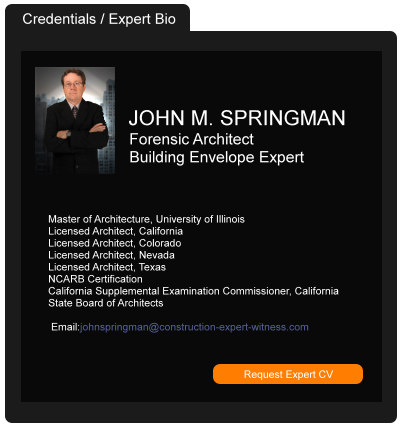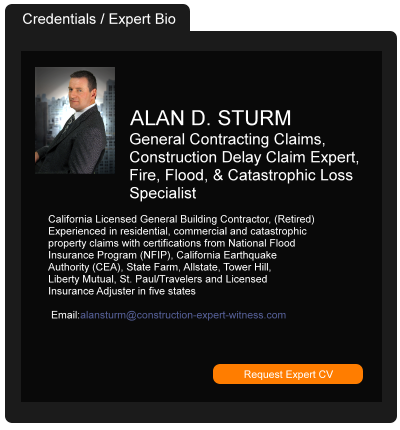Care, Custody or Control Exclusion Requires Complete and Exclusive Control by Insured Claiming Coverage
July 30, 2019 —
Christopher Kendrick & Valerie A. Moore – Haight Brown & Bonesteel LLPIn McMillin Homes Construction v. Natl. Fire & Marine Ins. Co. (No. D074219, filed 6/5/19) a California appeals court held that a “care, custody or control” exclusion did not bar coverage for defense of a general contractor as an additional insured under a subcontractor’s policy, because the exclusion requires exclusive control, but the facts and allegations posed a possibility of shared control with the subcontractor.
McMillin was the general contractor on a housing project and was added as an additional insured to the roofing subcontractor’s policy pursuant to the construction subcontract. The homeowners sued, including allegations of water intrusion from roof defects. McMillin tendered to the roofing subcontractor’s insurer, which denied a defense based on the CGL exclusion for damage to property within McMillin’s care, custody or control.
In the ensuing bad faith lawsuit, McMillin argued that the exclusion required complete or exclusive care, custody or control by the insured claiming coverage, which was not the case for McMillin. The insurer argued that the exclusion said nothing about complete or exclusive care, custody or control. Further, the intent to exclude coverage for damage to any and all property in McMillin’s care, custody or control, to whatever degree, was demonstrated by the fact that the additional insured endorsement in question was not an ISO CG2010 form, but a CG2009 form, which expressly adds a care, custody or control exclusion to the additional insured coverage not found in the CG2010 form. The argument was that the CG2009 form evidences an intent to conclusively eliminate coverage for property in the additional insured’s care, custody or control. In addition, the insurer argued that this result was also reinforced by its inclusion of an ISO CG2139 endorsement in the roofer’s policy, which eliminated that part of the “insured contract” language of the CGL form, defining an “insured contract” as “[t]hat part of any other contract or agreement pertaining to your business . . . under which you assume the tort liability of another party to pay for ‘bodily injury’ or ‘property damage’ to a third person or organization.” The insurer’s argument was that by having eliminated coverage for contractual indemnity or hold harmless agreements, it had “closed the loop” of eliminating additional insured coverage for construction defect claims.
Reprinted courtesy of
Christopher Kendrick, Haight Brown & Bonesteel LLP and
Valerie A. Moore, Haight Brown & Bonesteel LLP
Mr. Kendrick may be contacted at ckendrick@hbblaw.com
Ms. Moore may be contacted at vmoore@hbblaw.com
Read the court decisionRead the full story...Reprinted courtesy of
Proving Contractor Licensure in California. The Tribe Has Spoken
October 21, 2015 —
Garret Murai – California Construction Law BlogAs I mentioned in an earlier post, in California you must “prove” you’re a licensed contractor in a construction case. But in whose hands are you entitled to place your fate – the judge or the jury?
Well, the tribe has spoken.
Jeff Tracy, Inc. v. City of Pico Rivera
In Jeff Tracy, Inc. v. City of Pico Rivera, Case Nos. B258563 and B258648, California Court of Appeals for the Second District (September 15, 2015), general contractor Jeff Tracy, Inc. doing business as Land Forms Construction (“Land Forms”) was walloped with a nearly $5.5 million judgment for being improperly licensed on a park project owned by the City of Pico Rivera (“City”). The judgment followed a bench trial over Land Form’s objection that it was entitled to a jury trial.
Read the court decisionRead the full story...Reprinted courtesy of
Garret Murai, Wendel Rosen Black & Dean LLPMr. Murai may be contacted at
gmurai@wendel.com
Four Things Construction Professionals Need to Know About Asbestos
September 23, 2019 —
Daniel King - Construction ExecutiveAlthough asbestos had its heyday in America half a century ago, asbestos exposure remains a major health risk and financial liability for construction professionals. One study estimates that at least 1.3 million construction industry workers are still at risk for occupational asbestos exposure.
Up until the 1980s, U.S. manufacturers mixed asbestos into thousands of construction products. Asbestos is a unique mineral that can be worked into flexible fibers while still retaining its durability and heat resistance. Unfortunately, the fibrous nature of asbestos also makes it highly toxic.
This article provides an overview of what construction professionals need to know about asbestos, including:
- potential long-term health consequences of asbestos exposure for workers and short-term financial consequences for employers;
- Occupational Safety and Health Administration asbestos regulations;
- how to identify and safely remove asbestos-containing materials; and
- what people should do if they have a history of asbestos exposure.
Reprinted courtesy of
Daniel King, Construction Executive, a publication of Associated Builders and Contractors. All rights reserved.
Read the court decisionRead the full story...Reprinted courtesy of
Mr. King may be contacted at
dking@asbestos.com
Surplus Lines Carriers Cannot Compel Arbitration in Louisiana
May 29, 2023 —
Tred R. Eyerly - Insurance Law HawaiiThe court denied the surplus lines insurer's motion to compel arbitration based on Lousiana's law prohibiting arbitrations of coverage disputes. Fairway Village Condominiums v. Independent Spec. Ins. Co., 2023 U.S. Dist. LEXIS 62135 (E.D. La. April 20, 2023).
The plaintiff's condominium complex was damaged by Hurricane Ida. A claim was filed with the insurer. The insurer made an initial advance payment of $200,000. Three additional payments were made bringing the total to $951,462.49, which was less than half of the proof of loss amounts submitted by plaintiff.
Plaintiff sued the insurer for breach of contract and bad faith. The insurer filed a motion to compel arbitration based upon an arbitration provision in the policy. Recognizing that Louisiana law prohibited enforcement of a policy's arbitration clause, the insurer argued it did not apply because it was a surplus lines carrier.
Read the court decisionRead the full story...Reprinted courtesy of
Tred R. Eyerly, Damon Key Leong Kupchak HastertMr. Eyerly may be contacted at
te@hawaiilawyer.com
Want a Fair Chance at a Government Contract? Think Again
July 13, 2017 —
Duane Craig - Construction InformerIf you’ve ever missed out on a government contract, part of the reason might have been because entrenched government contractors gained competitive advantages by under-paying their workers. The Fair Pay & Safe Workplaces executive order was nullified by Congress this year and much of the reporting by the business press presented just one side of the story. Here’s another perspective.
When awarding federal contracts the government is supposed to consider each contractor’s compliance with labor laws related to pay, health and safety. But, there is a huge problem with enforcement on a government contract, according to Senator Elizabeth Warren and other observers.
- Some federal contractors frequently underpay their workers violating wage and hour laws. More than 300,000 workers were cheated out of pay while working under federal contracts in the last decade. There were 12,000 companies working on federal contracts that were doing the cheating.
- 692 federal contractors significantly violated federal labor laws, and then repeated the behavior, over and over. The repeat offenders receive millions in taxpayer dollars as they violated safety and health standards. Those violations caused a wide range of physical harm to workers. Dozens of workers died, and countless numbers were exposed to chemicals that cause long term health problems.
Read the court decisionRead the full story...Reprinted courtesy of
Duane Craig, Construction InformerMr. Craig may be contacted at
dtcraig@constructioninformer.com
The Burden of Betterment
February 23, 2017 —
Ryan M. Charlson, Esq. - Florida Construction Law NewsThe concept of betterment has long been used by defendants in cases involving defective design or construction to limit the damages awarded to a plaintiff.[1] The theory behind betterment is that: “if in [the] course of making repairs [an] owner adopts a more expensive design, recovery should be limited to what would have been the reasonable cost of repair according to original design.”[2] Betterment is often raised as an affirmative defense, requiring a defendant to prove that the plaintiff has received a good or service that is superior to that for which the plaintiff originally contracted. A recent South Florida case seems, at first blush, to suggest the burden of establishing the value of betterments may fall to the plaintiff, although a closer reading indicates the decision is likely to have limited applicability.
In Magnum Construction Management Corp. v. The City of Miami Beach, the Third District Court of Appeal was asked to review the damages award to the City for construction defects associated with the redesign and improvement of a park.[3] The completed project contained landscaping deficiencies, along with other “minor defects” in the playground’s construction.[4] After a unilateral audit, and without providing the contractor its contractually required opportunity to cure the defects, the City “removed, redesigned, and replaced the playground in its entirety.”[5] It did so despite no recommendation by the City’s own expert to perform such work.[6] During the bench trial, the “only measure of damages provided by the City was the costs associated with the planning, permitting, and construction of a park that is fundamentally different from the one it contracted with [the contractor] to build.”[7]
Read the court decisionRead the full story...Reprinted courtesy of
Ryan M. Charlson, Cole, Scott & Kissane, P.A.Mr. Charlson may be contacted at
ryan.charlson@csklegal.com
Contractors May be Entitled to Both Prompt Payment Act Relief and Prejudgment Interest for a Cumulative 24%!
August 22, 2022 —
Margarita Kutsin - Ahlers Cressman & SleightThe Washington Prompt Payment Act, in Ch. 39.76 RCW and in RCW 39.04.250, ensures that contractors and subcontractors are promptly paid for their performance on public works contracts. Where a government entity or a prime contractor wrongfully withholds undisputed amounts due, that government entity or prime contractor must pay interest at a rate of 12% per annum.
Separately, prejudgment interest is awarded “based on the principle that a defendant ‘who retains money which he ought to pay to another should be charged interest upon it.’” Hansen v. Rothaus, 107 Wn.2d 468, 472, 730 P.2d 662 (1986) (quoting Prier v. Refrigeration Eng’g Co., 74 Wn.2d 25, 34, 442 P.2d 621 (1968)). The purpose is to “compensate the plaintiff for the use value of the money representing liquidated or determinable damages.” Id.
Read the court decisionRead the full story...Reprinted courtesy of
Margarita Kutsin, Ahlers Cressman & SleightMs. Kutsin may be contacted at
margarita.kutsin@acslawyers.com
Texas City Pulls Plug on Fossil Fuels With Shift to Solar
March 19, 2015 —
Christopher Martin – Bloomberg(Bloomberg) -- A city in the heart of the oil state of Texas is set to become one of the first communities in the U.S. to wean its residents off fossil fuels.
The municipal utility in Georgetown, with about 50,000 residents, will get all of its power from renewable resources when SunEdison Inc. completes 150 megawatts of solar farms in West Texas next year. The change was announced Wednesday.
It will be the first city to completely embrace clean power in the state, which is the biggest U.S. producer and user of natural gas. More will follow as municipalities seek to insulate themselves from unpredictable prices for fossil fuels, said Paul Gaynor, SunEdison’s executive vice president of North America. Burlington, Vermont, made a similar move with its purchase of a hydroelectric plant last year.
Read the court decisionRead the full story...Reprinted courtesy of
Christopher Martin, BloombergMr. Martin may be contacted at
cmartin11@bloomberg.net


































































